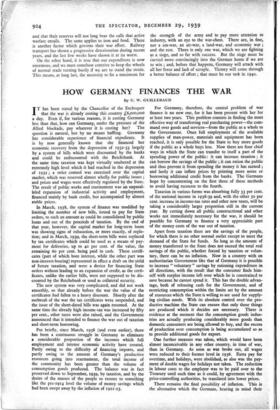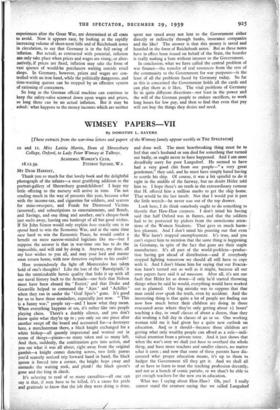HOW GERMANY FINANCES THE WAR
By C. W. GUILLEBAUD
IT has been stated by the Chancellor of the Exchequer that the war is already costing this country L6,000,000 a day. Even if, for various reasons, it is costing Germany less than that, how can Germany, under the pressure of the Allied blockade, pay whatever it is costing her? The question is natural, but by no means baffling. Germany has considerable experience of financial expedients. It is by now generally known that she financed her economic recovery from the depression of 1932-33 largely by a system of bills which were discounted by the banks and could be rediscounted with the Reichsbank. At the same time taxation was kept virtually unaltered at the extremely high level which it had reached in the depression of 1932 ; a strict control was exercised over the capital market, which was reserved almost wholly for public issues ; and prices and wages were effectively regulated by the State. The result of public works and rearmament was an unparal- leled expansion of industrial activity and employment, financed mainly by bank credit, but accompanied by almost stable prices.
In March, 1938, the system of finance was modified by limiting the number of new bills, issued to pay for State orders, to such an amount as could be consolidated by public loans and out of the proceeds of taxation. By the end of that year, however, the capital market for long-term loans was showing signs of exhaustion, or more exactly, of reple- tion; and in March, 1939, the short-term bills were replaced by tax certificates which could be used as a means of pay- ment for deliveries, up to 40 per cent. of the value, the remaining 6o per cent. being paid in cash. These certifi- cates (part of which bore interest, while the other part was non-interest-bearing) represented in effect a draft on the yield of future taxation, and were a device for financing State orders without leading to an expansion of credit, as the certi- ficates, unlike the earlier bills, were not supposed to be dis- counted by the Reichsbank or used as collateral security.
The new system was very complicated, and did not work smoothly, so that already before the war the value of the certificates had fallen to a heavy discount. Shortly after the outbreak of the war the tax certificates were suspended, and the issue of the short-dated bills was again resumed. At the same time the already high income-tax was increased by fifty per cent., other taxes were also raised, and the Government announced that it intended to finance the war out of taxation and short-term borrowing.
Put briefly, since March, 1938 (and even earlier), there has been a continuous struggle in Germany to eliminate a considerable proportion of the incomes which full employment and intense economic activity have created. Partly owing to the difficulty of financing imports, and partly owing to the amount of Germany's productive resources going into rearmament, the total income of the community has been greater than the volume of consumption goods produced. The balance was in fact preserved down to September, 1939, by taxation, and by the desire of the masses of the people to restore to something like the pre-1914 level the volume of money savings which had been swept away by the inflation of 1921-23. For Germany, therefore, the central problem of war finance is no new one, for it has been present with her for at least two years. This problem consists in finding the most effective way of transferring real purchasing power—the com- mand over goods and services—from the public as a whole to the Government. Once full employment of the available supplies of man-power, materials and equipment has been reached, it is only possible for the State to buy more goods if the public as a whole buys less. Now there are four chief ways in which the State can transfer to itself a part of the spending power of the public: it can increase taxation ; it can borrow the savings of the public ; it can ration the public and thus prevent it from spending the money it has earned ; and lastly it can inflate prices by printing more notes or borrowing additional credit from the banks. The Germans hope by concentrating on the first three of these methods to avoid having recourse to the fourth.
Taxation in various forms was absorbing fully 33 per cent. of the national income in 1938-39 and, with the other 5o per cent. increase in income-tax rates and other new taxes, will be taking a considerably larger proportion still in the current year. By cutting down all public constructional and other works not immediately necessary for the war, it should be possible for Germany to finance a very appreciable part of the money costs of the war out of taxation.
Apart from taxation there are the savings of the people, for which there is no other normal outlet except to meet the demand of the State for funds. So long as the amount of money transferred to the State does not exceed the total real savings of the public, whether forced by taxation or volun- tary, there can be no inflation. Now in a country with an authoritarian Government like that of Germany it is possible to increase " voluntary " savings by rationing expenditure in all directions, with the result that the consumer finds him- self with surplus income left over which he is constrained to save because he cannot spend it. This has the double advan- tage, both of releasing cash for the Government, and of restricting consumption within the limits set by the amount of resources which the State is willing to see used for supply- ing civilian needs. With its absolute control over the pro- ductive machine the State can ensure that only those things are produced which it decides are necessary. There is evidence at the moment that the consumption goods indus- tries are actually producing considerably more goods than domestic consumers are being allowed to buy, and the excess of production over consumption is being accumulated so as to provide additional goods for export.
One further measure was taken, which would have been almost inconceivable in any other country, in time of war, than in Germany As soon as war broke out, all wages were reduced to their former level in 1936. Extra pay for overtime, and holidays, were abolished, as also was the pay- ment of double wages for holidays not taken. The reduction in labour costs to the employer was to be paid over to the Treasury until such time as it could, by agreement with the price-controlling authorities, be translated into lower prices.
There remains the final possibility of inflation. This is the alternative which the Germans, bearing in mind their experiences after the Great War, are determined at all costs to avoid. Now it appears easy, by looking at the rapidly increasing volume of short-term bills and of Reichsbank notes in circulation, to say that Germany is in the full swing of inflation. But actual, as contrasted with potential, inflation can only take place when prices and wages are rising; or alter- natively, if prices are fixed, inflation may take the form of vast queues of would-be purchasers waiting outside retail shops. In Germany, however, prices and wages are con- trolled with an iron hand, while the politically dangerous, and time-wasting queues can be stopped by an effective system of rationing of consumers.
So long as the German official machine can continue to keep the safety-valve screwed down upon wages and prices, so long there can be no actual inflation. But it may be asked: what happens to the money incomes which are neither spent nor taxed away nor lent to the Government either directly or indirectly through banks, insurance companies and the like? The answer is that this money is saved and hoarded in the form of Reichsbank notes. But as these notes have in effect been issued on behalf of the State, the hoarder is really making a loan without interest to the Government. In conclusion, what we have called the central problem of war finance—the transfer of real resources from the rest of the community to the Government for war purposes—is the least of all the problems faced by Germany today. So far as this is concerned the Government holds all the cards and can play them as it likes. The vital problems of Germany lie in quite different directions—not least in the power and the will of the German people to endure sacrifices, to work long hours for low pay, and then to find that even that pay will not buy the things they desire and need.































 Previous page
Previous page